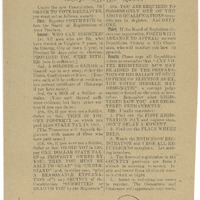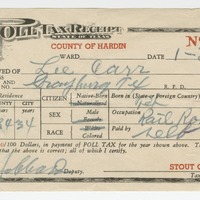 15th Amendment to the United States Constitution (1870) 15th Amendment to the United States Constitution (1870) |
|
The Fifteenth Amendment granted the right to vote to African American men by prohibiting the denial of suffrage based on race, color, or previous condition of servitude. The amendment was passed by Congress February 26, 1869, and ratified February 3, 1870.
|
 19th Amendment to the United States Constitution (1920) 19th Amendment to the United States Constitution (1920) |
|
The Nineteenth Amendment granted women the right to vote by prohibiting the denial of suffrage based on sex. The amendment was passed by Congress June 4, 1919, and ratified August 18, 1920.
|
 24th Amendment to the United States Constitution (1964) 24th Amendment to the United States Constitution (1964) |
|
The Twenty-Fourth Amendment prevents the use of poll taxes in elections. It was passed during the 1960s Civil Rights Movement along with the Voting Rights Act of 1965 to actualize voting rights for people of all races guaranteed by the 15th Amendment. The amendment was passed by Congress August 27, 1962, and ratified January 23, 1964.
|
 An Act in Relation to Female Suffrage (1871) An Act in Relation to Female Suffrage (1871) |
|
This act in Washington Territory specifically denied women the right to vote. Women were given the right to vote with the passage of the 19th Amendment, nearly 50 years later.
|
 An Act Relating to Woman Suffrage (1897) An Act Relating to Woman Suffrage (1897) |
|
This act proposed to amend the Constitution of Washington State to grant women suffrage rights. Washington was one of 12 states to grant women the right to vote prior to the adoption of the 19th Amendment in 1920.
|
 An Act to Grant to the Women of Wyoming Territory the Right of Suffrage and to Hold Office (1869) An Act to Grant to the Women of Wyoming Territory the Right of Suffrage and to Hold Office (1869) |
|
Wyoming was the first state to grant women suffrage rights. This act was the first in the world to grant women the right to vote and access to holding public office. It came 50 years before the 19th Amendment that guaranteed women's suffrage to the entire United States. Wyoming was the first of 15 states to grant women suffrage rights prior to the passage of the 19th Amendment.
|
 Enforcement Act of 1870 Enforcement Act of 1870 |
|
The Enforcement Act of 1870 was enacted to enforce the 15th Amendment during Reconstruction. It explicitly prohibited the use of terror, force, or disguise to violate a voter's constitutional right. This law was intended to protect the voting rights of Black Americans and penalize state officials and violent groups like the Ku Klux Klan who interfered.
|
 Enforcement Act of 1871 Enforcement Act of 1871 |
|
The Enforcement Act of 1871 revised the Enforcement Act of 1870 to further protect Black Americans' right to vote and hold office. It added more severe punishments to those who violated the constitutional rights of Black Americans. This act specifically called for federal oversight of national elections and empowered federal judges and marshals to supervise local polling places.
|
 Equal Protection, Reconstruction, and the Meaning of the 14th Amendment Equal Protection, Reconstruction, and the Meaning of the 14th Amendment |
|
This teaching module discusses the 14th Amendment and the implications of equal protection under the law, featuring a webinar with Kate Masur, author of the 2021 book, Until Justice Be Done: America's First Civil Rights Movement, from the Revolution to Reconstruction.
|
 New Jersey Constitutional Franchise Provision (1776) New Jersey Constitutional Franchise Provision (1776) |
|
This provision of the first New Jersey Constitution did not limit franchise by race or gender, allowing unmarried women and free people of color who could meet the property requirement to vote. When New Jersey rewrote its constitution in 1844, it explicitly denied women and African Americans the right to vote.
|
 New Jersey Disfranchisement Statute (1807) New Jersey Disfranchisement Statute (1807) |
|
This New Jersey statute explicitly banned women and free people from color from voting, after these groups had been enfranchised since 1776. When New Jersey rewrote its constitution in 1844, it explicitly denied women and African Americans the right to vote.
|
 New Jersey Franchise Statute (1797) New Jersey Franchise Statute (1797) |
|
This New Jersey statute explicitly added women to their voting laws, while also allowing free people of color to vote. When New Jersey rewrote its constitution in 1844, it explicitly denied women and African Americans the right to vote.
|
 Notice to Republican Voters of the 9th Congressional District of Virginia (1902) Notice to Republican Voters of the 9th Congressional District of Virginia (1902) |
|
This broadside publicized information about new voting laws and poll taxes in Virginia.
|
 Poll Tax Receipt for Lee Carr (1955) Poll Tax Receipt for Lee Carr (1955) |
|
An image of a poll tax receipt from Texas. Poll taxes were a tool to prevent Black people and poor people from voting, since the poll tax was often a significant percentage of someone's weekly income.
|
 President Johnson's Commencement Address at Howard University: "To Fulfill These Rights" (1965) President Johnson's Commencement Address at Howard University: "To Fulfill These Rights" (1965) |
|
In this speech given to Howard University's 1965 graduating class, President Lyndon B. Johnson talks about the Civil Rights and Voting Rights Acts being passed as a result of the Civil Rights Movement and the long-lasting impacts of systemic racism.
|
 Report of the Woman's Rights Convention Held at Seneca Falls (1848) Report of the Woman's Rights Convention Held at Seneca Falls (1848) |
|
Generally credited as the first call for equal rights for women, this document is the result of the Seneca Falls Convention of 1848. It calls for suffrage rights for women, as well as equal rights in all aspects of society. The convention was organized by Elizabeth Cady Stanton and Lucretia Mott, both women were from abolitionist families, highlighting a sharp divide between women’s rights advocates before and after the Civil War.
|
 Shelby County v. Holder (2013) Shelby County v. Holder (2013) |
|
This landmark Supreme Court decision overturned the federal pre-clearance section the Voting Rights Act of 1965 which required jurisdictions to seek approval from the Department of Justice or the U.S. District Court for D.C., before making changes to their voting laws. This decision limited the federal government's ability to protect voting rights for all citizens and has since allowed policies such as voter ID laws and the closing polling locations to limit voting rights for certain groups.
|
 Texas Poll Tax (1901) Texas Poll Tax (1901) |
|
This poll tax law in Texas was voted on in a referendum in the 1902 election as a proposed amendment to the state constitution.
|
 The Woman Suffrage Movement and Frederick Douglass (1908) The Woman Suffrage Movement and Frederick Douglass (1908) |
|
In this speech given on the 60th Anniversary of the Seneca Falls Convention, Black women's rights advocate Mary Church Terrell reflects on the role of Frederick Douglass in the women's suffrage movement.
|
 Vanguard: Black Women and the Right to Vote Vanguard: Black Women and the Right to Vote |
|
This teaching module discusses how Black women fought against both racism and sexism during their fight for women's suffrage, featuring a webinar with Martha S. Jones, author of the 2020 book, Vanguard: How Black Women Broke Barriers, Won the Vote, and Insisted on Equality for All.
|
 Voting Rights Act (1965) Voting Rights Act (1965) |
|
The Voting Rights Act of 1965 prohibits racial discrimination in voting, enforcing the voting rights protected by the Fourteenth and Fifteenth Amendments. Its intent was to outlaw the discriminatory voting practices adopted by many southern states against African Americans. Its power was severely reduced by the 2013 Supreme Court Decision in Shelby County v. Holder.
|
 Webinar - Equal Protection, Reconstruction, and the Meaning of the 14th Amendment (2023) Webinar - Equal Protection, Reconstruction, and the Meaning of the 14th Amendment (2023) |
|
In this webinar, Dr. Kate Masur of Northwestern University discusses the 14th Amendment and the implications of equal protection under the law with Dr. Sharlene Sinegal-DeCuir of Xavier University and Dr. William Thomas and his American Constitutional History class.
|
 Webinar - Vanguard: Black Women and the Right to Vote (2024) Webinar - Vanguard: Black Women and the Right to Vote (2024) |
|
In this webinar, Professor Martha S. Jones of Johns Hopkins University discusses Black women and the right to vote with Dr. William Thomas and his American Constitutional History class.
|
 Woman Suffrage in Territories (1883) Woman Suffrage in Territories (1883) |
|
This newspaper article discusses the women's suffrage act passed in Washington Territory. Washington was the third territory to grant women suffrage rights, although the Territorial Supreme Court later overturned the law.
|
 Wyoming Declaration of Rights (1889) Wyoming Declaration of Rights (1889) |
|
The first article of the State of Wyoming's Constitution enumerates certain rights within the state. Wyoming Territory was the first government to grant women suffrage rights, and that right was preserved in the Declaration of Rights when organizing the state government.
|
 15th Amendment to the United States Constitution (1870)
15th Amendment to the United States Constitution (1870) 19th Amendment to the United States Constitution (1920)
19th Amendment to the United States Constitution (1920) 24th Amendment to the United States Constitution (1964)
24th Amendment to the United States Constitution (1964) An Act in Relation to Female Suffrage (1871)
An Act in Relation to Female Suffrage (1871) An Act Relating to Woman Suffrage (1897)
An Act Relating to Woman Suffrage (1897) An Act to Grant to the Women of Wyoming Territory the Right of Suffrage and to Hold Office (1869)
An Act to Grant to the Women of Wyoming Territory the Right of Suffrage and to Hold Office (1869) Enforcement Act of 1870
Enforcement Act of 1870 Enforcement Act of 1871
Enforcement Act of 1871 Equal Protection, Reconstruction, and the Meaning of the 14th Amendment
Equal Protection, Reconstruction, and the Meaning of the 14th Amendment New Jersey Constitutional Franchise Provision (1776)
New Jersey Constitutional Franchise Provision (1776) New Jersey Disfranchisement Statute (1807)
New Jersey Disfranchisement Statute (1807) New Jersey Franchise Statute (1797)
New Jersey Franchise Statute (1797) Notice to Republican Voters of the 9th Congressional District of Virginia (1902)
Notice to Republican Voters of the 9th Congressional District of Virginia (1902) Poll Tax Receipt for Lee Carr (1955)
Poll Tax Receipt for Lee Carr (1955) President Johnson's Commencement Address at Howard University: "To Fulfill These Rights" (1965)
President Johnson's Commencement Address at Howard University: "To Fulfill These Rights" (1965) Report of the Woman's Rights Convention Held at Seneca Falls (1848)
Report of the Woman's Rights Convention Held at Seneca Falls (1848) Shelby County v. Holder (2013)
Shelby County v. Holder (2013) Texas Poll Tax (1901)
Texas Poll Tax (1901) The Woman Suffrage Movement and Frederick Douglass (1908)
The Woman Suffrage Movement and Frederick Douglass (1908) Vanguard: Black Women and the Right to Vote
Vanguard: Black Women and the Right to Vote Voting Rights Act (1965)
Voting Rights Act (1965) Webinar - Equal Protection, Reconstruction, and the Meaning of the 14th Amendment (2023)
Webinar - Equal Protection, Reconstruction, and the Meaning of the 14th Amendment (2023) Webinar - Vanguard: Black Women and the Right to Vote (2024)
Webinar - Vanguard: Black Women and the Right to Vote (2024) Woman Suffrage in Territories (1883)
Woman Suffrage in Territories (1883) Wyoming Declaration of Rights (1889)
Wyoming Declaration of Rights (1889)